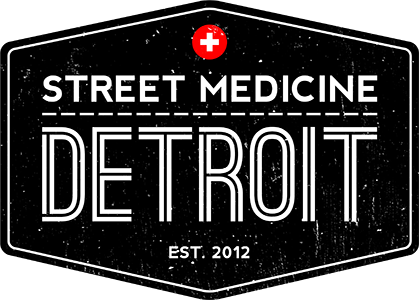It's often easy to understand how a Street Medicine Detroit street run impacts our patient population. Patients leave with newly-dressed wounds, medication for their chronic illness, relief their medical concern isn't so serious after all, or at least a look of momentary satisfaction that someone listened to their concerns. These are the things that inspire everyone at SMD to put in the time and effort to make our organization a reality. However, in all of the positive work SMD does, people often lose sight of how Street Medicine Detroit adds to the medical education of many students at Wayne State University. To help explore these additional benefits, here are a few reflections that demonstrate what medical students find on street runs that aren't part of the traditional curriculum:
Role Models: SMD introduces medical students to physicians who demonstrate how to engage a neglected population
"From the moment you meet him, it's clear Dr. Bryce genuinely cares about people, regardless of whether they are a patient or not. He exudes interest in you as a person and any concerns you may have. This ability to instantaneously connect with an individual makes Dr. Bryce an excellent physician; his demeanor relaxes patients and encourages them to reveal fears they wouldn't normally share. More importantly, though, this quality makes Dr. Bryce particularly well-suited to engage with individuals facing homelessness. Dr. Bryce's friendly face and demeanor help him bridge this trust gap between him and homeless patients much better than most physicians. Furthermore, Dr. Bryce completely invests himself in every interaction. If he's talking with you, you have his full attention, and he's going to enlist every tool at his disposal to help solve your problem. Perhaps more than any other population, homeless patients require this tenacity. Unlike a patient encountered in a traditional clinic, individuals facing homelessness have fewer resources and face more challenges. Only with resolve and creativity is it possible for physicians like Dr. Bryce to find solutions for the issues impacting the homeless population."
-Eric Walton, MS2
Early Patient Interaction: SMD offers medical students an opportunity to apply clinical knowledge in a dynamic, rather than structured, environment
"Going on a street run was the first time I got to do a complete patient interview with a real patient who didn’t follow a script or already know what questions I might ask. It was a great learning experience, and very rewarding to see the patient react positively to my interview. Additionally, our preceptor, Nurse Dean, was great at explaining diagnoses to a first year medical student. He was able to correlate classic disease presentations from patients with the basic science material I've learned in class. Combining clinical knowledge and skills together with a real patient made it easier to retain information and apply it again in the future, both on exams and with other patients."
-Yusra Oral, MS2
Perspective: SMD forces medical students to reconsider priorities and privilege
"For doctors in training, SMD is the perfect reminder of the answer to the question posed in our interviews: "why medicine?" As medical students, we pledged an oath to serve patients when they are at their worst, without judgment. This is the most important objective of medicine that is easily forgotten among the basic science lessons of the first two years; the overwhelming volume of work in residency; and the problematic system of running a practice, figuring out the insurance companies and dealing with administrative nonsense. Serving the homeless population of Detroit has made me look at life differently. It is amazing to me how positive people can be in the face of despair and how simply one can ease some of that pain by providing basic medical care, conversation, encouragement and respect. Street Medicine has been an anchor that keeps me grounded and reminds me why I subject myself to hours upon hours of studying and sacrificing. It has also been a reminder of how fortunate we are as medical students. When I go to sleep at night, having had the invaluable experience of working with this organization, I am reminded of my obligation to serve rather than self-serve. This allows me to tackle everyday with enthusiasm and hope that I will be able to continue impacting patient’s lives, no matter who they are, where they come from or how challenging their situation may be."
-Andrew Failla, MS2

